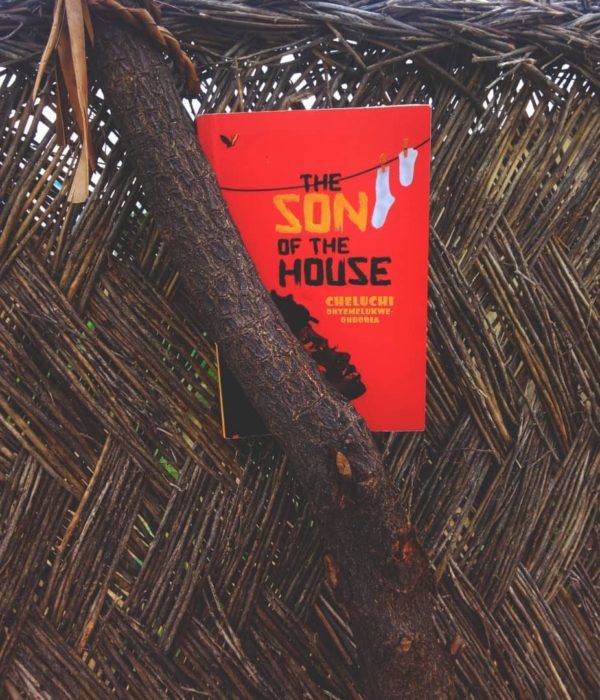
You will love reading The Son of the House, Cheluchi Onyemelukwe-Onuobia’s debut work of fiction. You put it down but it dares you to forget that it exists. You can’t. You always go back to it. The reader is haunted by its quiet dignity, the defiance of its story that insists on a narrative built together, word by word, on the owner’s own terms. There is energy in its sadness, energy in its characters’ triumphs. You will be entertained and educated by this unpretentious little book. It is one of those books that suggest that the book is not going away without a hard fight. Long live the (paper copy) book.
The Son of the House is mostly about two women separated by distance and class whose narratives collide over a shared trauma. It is more than that, though; in a real sense, Onyemelukwe-Onuobia’s book is about the politics of narrative, and the power of the story in shaping perceptions about the reality of people’s lives. What passes for contemporary African literature has been under scrutiny in terms of who it caters to—and at what price. For many reasons, African writers have had to look to the West for a paying readership. This has come at a huge price to the credibility and integrity of the stories. While the West has helped to sponsor and showcase African stories, many of them have been compromised by the need to translate thought, motives and words in ways that the typical Westerner would understand and appreciate. After all, she who pays the African writer dictates the narrative.
The good news is that some writers are beginning to get off their begging knees and are now insisting on writing on their own terms. Onyemelukwe-Onuobia, who is one of those, is a lawyer, academic and advocate on issues of health and gender-based violence. Her book debuts at a time when African writers are on the defensive for merely chronicling Africa’s issues in their books for fame and fortune, while at best doing nothing in terms of political and social advocacy or activism, in many cases being the silent writers writing talking points for evil rulers, preferring to leave the hard work of fighting causes to the youths of social media. In this age, Onyemelukwe-Onuobia’s use of her NGO and legal training to empower many who would otherwise be voiceless and powerless makes her a real asset.
Onyemelukwe-Onuobia has no apologies for the way she tells this story; she rarely explains the Nigerian terms in her book, preferring that you google the words yourself—when she does, it is transparent to the reader who is blissfully unaware that he just learned a new term. She has an attitude; if she feels like explaining it to you, she just might. Otherwise, Google is your dictionary. In this book, both the poor and the dispossessed and the well to do have a powerful and eloquent historian. For many years, I have been immersed in a feisty debate about the othering or italicization of African words, arguing that egusi is just as English as crumpets—just google it. However, not all thinkers agree on a strategy as Jumoke Verissimo articulates eloquently in a recent essay. Hear Verissimo:
The other truth is that writing in English amplifies my voice in a distracted world, which also wants to flatten difference. However, as I am of two worlds, there is no way what I write in English would not find my Yoruba self in it. It is not impossible to achieve, rather for me, it is important to achieve a commingling of the two languages in my writing. It is like I mentioned earlier, the “enriching” and “embellishing” dynamics. I am too aware that in this dynamic, the non-hegemonic language will be the one to fall flat and unelevated, remaining an embellishment. Italics are therefore an assertion of selfhood, made self-evident in my creative writing. It is how to tell my readers: I am not of one world. Knowing when I use the italics, I am inviting the reader to pause and reflect on the fact that they have stumbled on another world with all its flourishes. In my usage, I am therefore not consenting to othering, I am ordering the language as I intend it to be used.
But read The Son of the House and Achebe’s vision—“Let no one be fooled by the fact that we may write in English, for we intend to do unheard of things with it”—smirks at you. Just as Achebe took the English language and appropriated it in such a way that the reader thinks he is reading Igbo, Onyemelukwe-Onuobia’s book immerses you fully in a Nigerian culture with the words and context faithfully glued to it.
The Son of the House is published by Penguin Random House South Africa; their work is a beautiful throwback to the days of African writers of old, who wrote for Heinemann, Penguin, Fontana, etc. before the coming of social media, before the mindless rush for literary prizes and grants and conferences and workshops—definitely before MFA mills came to compromise raw gifts with their mindless insistence on uniformity of creative output. In this book, I see Flora Nwapa, Chukwuemeka Ike and Cyprian Ekwensi. This is not today’s poverty porn.
It is courageous the way Onyemelukwe-Onuobia insists on writing in Nigerian English; I lapped up the lovely turns of phrases. Just as I dreamt of one day watching Chimamanda Adichie’s Half of a Yellow Sun as a movie, I can see this beautiful little book ending up as a movie. The sentences come at you and create three dimensional scenes that make you wish you were watching a movie.
Onyemelukwe-Onuobia is good at characterisation. She sure can describe people and when she does their faces tell their own stories.
She sat with us behind the house where we cooked each evening, waiting for the night to come and bring with it supper and sleep. Nnanna, my stepbrother, was kicking an old Bournvita can that Mama Nkemdilim had thrown out—the bottom had fallen out in protest after years of use. I was pounding ogbono for soup.
(P. 82).
Even a used can is a character here.
It is said of our mothers’ generation of wives that, in their marriages, they enjoyed what they could and endured the rest. This passage reminds me very much of my late mother and how the things we romanticize about their lives were really awful:
It is not every woman who can do what you are doing: widowed at a time when other women are still enjoying the embrace of a man, his protection, and his hard work. I, too, was widowed like you. When my husband lived, he beat me until my people threatened to beat him up. Yet when he died, I knew that life was more difficult for a widow than a woman, even a man that had married a man who beat her.” She paused. We said nothing. We waited. I wondered how she could speak well of a man who beat her, even if he was dead.
(P. 83).
The Son of the House rises in intensity and passion. It unearths forgotten traditions, like marrying a dead man to continue his lineage. A quiet rage takes over the reader as they read lines like: “In our culture. . . a child belonged to the father, not the mother.” Onyemelukwe-Onuobia’s strength lies in how she takes familiar subjects and anxieties and analyses them with cool, steely eyes and gentle humor. She interrogates African societies’ tendency to venerate the values of the other (the West) as the asymptote. She mourns the new perverse binary of Christian norms as the preferred model versus indigenous religious and spiritual values now reviled as “pagan practices.” In this lovely book, gentrification is mostly perverse in the way it has redefined and recreated clans based on class and money. Things have indeed fallen apart.
The obsession with mimicking the West’s values wrestles with the obsession with following tradition’s dictates—to be married, at all costs. This book takes on alcoholism, the patriarchy, sexism, the preference of male children over female children, single parenthood, class tensions, and more. One reflects on the fate of children caught in wars they didn’t ask for. Child abuse is real and rampant in Nigeria, and it didn’t start yesterday. Child labor reminds me of Chukwuemeka Ike’s The Potter’s Wheel.
The Son of the House is a tough book; several passages simply force the reader’s face in front of a mirror and never let go. Meticulous research shows in its accurate portrayal of decades of Nigerian history wrapped in an authentic ambience. Biafra. The coups. If you are going to read any new book on Nigeria, this one is it. Okay, fine, I don’t like the title, The Son of the House. I would have preferred Nwabulu. Nwabulu? Read the book!
About the Reviewer
Ikhide Ikheloa is a Nigerian social critic. He blogs at xokigbo.









Jude Onunkwo November 03, 2021 11:36
I'll find the book. It does seem a must read!